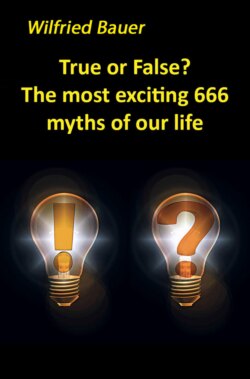Читать книгу True or False? The most, exciting 666 myths of our life - Wilfried Bauer - Страница 4
На сайте Литреса книга снята с продажи.
Foreword
ОглавлениеThe word myth comes from the Greek and is linked to the gods in ancient mythology as the existence of man. Myth originally means speech, word, sound, narrative, legendary story or fairy tale. In the colloquial language today, "mythical" means rather legendary, fabulous or even fairy-tale like to vague. A harder way would be to exchange the word for "error". Some of our everyday myths are also errors. If today we speak of the myths (errors) of everyday life, then they are traditions that have been passed on from generation to generation, sometimes for centuries. Many everyday myths have only been created in modern times - since the last one hundred years. Like for example the myths (misconceptions) about the microwave or chewing gum etc.
Despite scientific clarification, some of these vague statements are very persistent. Maybe some people just want to believe. It is remarkable that even highly intelligent people pass on such half-truths and believe in them themselves. In our writing we have questioned the most common ones that circulate among the population. Many of these former "truths" are now disproved and no longer tenable. Science has done a great job here as a detective. What is curious is that despite this, these errors are still very persistent in people's minds as "dogmas". We sometimes have the impression that these curiosities are engraved in people's minds forever.
It is interesting to see how many such "errors" are circulating among the people of today. Let's take a closer look at the most common of these modern fairy tales.
In this reading, the speaker not only emphasizes the correction of facts, but also wants to convey knowledge. That is why the book has a lexical part, like a red thread. The following example clearly demonstrates: "Myths about Coca-Cola" does not only contain the myths and misconceptions. The lexical part contains, for example, since when has the brown soda been around, who invented it, since when does it exist in Europe, how much is consumed in Germany, etc.
Or the myths about chewing gum: who invented it, since when did it exist, since when in Europe, who brought it to Europe etc.
The speaker wants to impart lexical knowledge besides the myths (errors). This has the advantage that the reader receives really valuable information on the basic topics (Coca-Cola, water, coffee, etc.) and can expand his knowledge.
